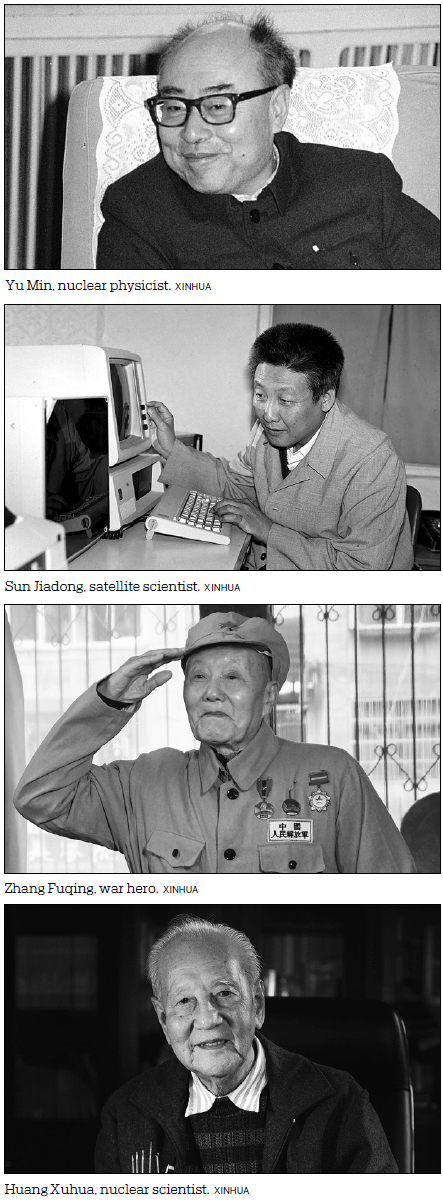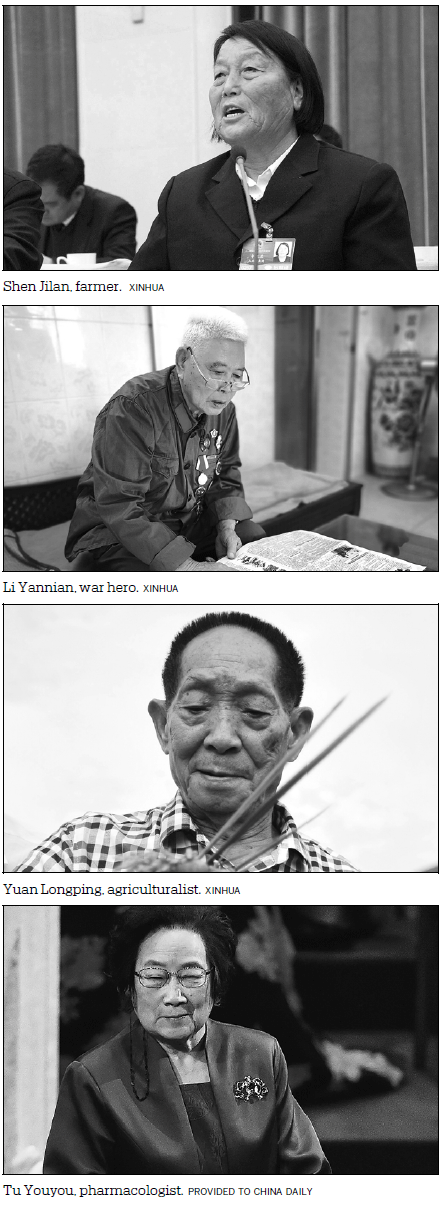Accolades of achievement
Editor's Note: Eight prominent figures have received the Medal of the Republic for their outstanding contributions to the country as the celebrations for the 70th anniversary of New China are being staged nationwide. China Daily presents a brief introduction to each winner.
Yu Min
Nuclear physicist Yu Min (1926-2019) played a crucial role in the design of China's nuclear weapons and won the Two Bombs, One Satellite Meritorious Award in 1999.
He enrolled in Peking University in 1944 and started to work at the Institute of Modern Physics at the Chinese Academy of Sciences in 1951.
The academician devoted himself to studying the hydrogen bomb for 28 years, during which time he had to conceal his identity as he led a tremendous breakthrough in nuclear physics.
China detonated its first hydrogen bomb on June 17, 1967, only two years and eight months after its first successful atomic-bomb test.
In the 1980s, Yu led his team to figure out the key technologies in the development of the second generation of nuclear weapons in China.
At that time, the United States had conducted over 1,000 nuclear tests while China had carried out just 45.
Yu was a senior science consultant at the China Academy of Engineering Physics and won the Qiu Shi Science and Technologies Foundation's Outstanding Scientist Award in 1994.
In January 2015, he won China's top science award for his outstanding contributions to the country's hydrogen-bomb research.
Shen Jilan
Shen Jilan has been a farmer her whole life.
She's the only person to serve at all 13 sessions of the National People's Congress since 1954. She started at the age of 25 and will turn 90 this December.
Shen is a role model for women's liberation and attended the World Congress of Women in Copenhagen in 1953.
It was Shen who proposed the clause "equal pay for equal work" between men and women, which was written into China's first Constitution in 1954.
She is deputy secretary of the Party committee of Xigou village in Shanxi province's Pingshun county. She married a soldier from the village and moved there aged 17. Today, she's leading the village out of poverty.
Shen developed as an entrepreneur, following the beginning of the reform and opening-up process in 1978, which enabled her to continue to win voters' trust.
In 1985, she opened a collectively owned ferroalloy plant with a bank loan.
It was the village's first enterprise and earned a 1.5 million yuan ($210,500) profit the first year. Later, a magnet factory, a stone-processing plant and a beverage factory were built in Xigou.
Pingshun is expected to shed its national-level impoverished-county classification by the end of this year.
In 2008, Shen was selected to carry the torch in the Beijing Olympics torch relay.
She has also been awarded the title of National Model Worker and honored as a National Excellent Communist Party Member.
Sun Jiadong
Carrier rocket and satellite technology expert Sun Jiadong made contributions to the country's satellite technology and space exploration programs in areas like satellite recovery, geosynchronous satellite launching, satellite navigation network technology and deep-space detection.
He is a member of the Chinese Academy of Sciences and the International Academy of Astronautics. Sun is also a former vice-minister of the Ministry of Aerospace Industry and a Two Bombs, One Satellite Meritorious Award laureate.
Born in Fuxian county, Liaoning province, in 1929, he enrolled in the Harbin Institute of Technology to start preparatory courses in Russian at the age of 18.
In 1958, Sun completed his studies in aircraft engineering at the Zhukovsky Air Force Academy in the Soviet Union and returned to China with a Stalin Gold Medal.
In 1967, Sun was appointed to design China's first satellite, Dongfanghong-1. It was successfully launched three years later.
In the 1970s, Sun was in charge of the team designing China's first recoverable remote-sensing satellite.
In 1984, he led the team to launch the country's first experimental communications satellite.
He was also the chief designer for the overall design of China's first medium-range missile and the Beidou navigation system.
In 2004, Sun became chief designer of China's lunar exploration program at age 75.
He also won the 2009 National Science and Technology Award.
Sun was also among 100 recipients of a Reform Pioneer medal in December 2018 to celebrate the 40th anniversary of the country's reform and opening-up.
Li Yannian
Li Yannian is a war hero born in Hebei province in 1928. He joined the army in 1945 and fought bravely in over 20 battles, including the War of Liberation (1946-49), the War to Resist US Aggression and Aid Korea, and the Counterattack Against Vietnam in Self-Defense.
In a battle on Black Mountain during the War of Liberation, Li and his comrades marched over 50 kilometers at night and reached their destination to build defenses before the enemy arrived in vehicles.
Li and many others courageously resisted intense attacks for three days, buying time for other troops to besiege and defeat their enemies.
He was awarded the title of First Class Hero, among other honors.
After his retirement, he donated most of his medals to museums and gave lectures to young people, telling them about the experiences he faced with his comrades to pass this spirit to the next generation.
After winning the Medal of the Republic, he says: "The honors are not for me alone but are for all martyrs. We should always remember the heroes who sacrificed their lives for our country."
Zhang Fuqing
Zhang Fuqing is a war hero, who was born in a poor family in Shaanxi province in 1924. He joined the People's Liberation Army in 1948 and fought courageously in the War of Liberation, achieving military glory in several key battles.
Zhang was twice awarded the title of Combat Hero and won many other war medals.
But he kept his battle achievements a secret. His family members didn't know about them until 2018, when authorities collected information about veterans nationwide.
After he retired from military service in 1955, he chose to work in remote and mountainous Laifeng county in Hubei province, where he made every effort to serve society. He led them to build roads and construct a hydropower station to bring electricity to locals.
President Xi Jinping called upon society to carry forward Zhang's spirit and dedication in a written statement released on May 24 this year.
Xi hailed Zhang's deeds, saying the elderly hero has stayed true to his original aspirations. As a soldier, Zhang defended the country. As a civilian, he works for people's wellbeing.
Zhang lives a life of simplicity, purity and indifference to fame and fortune. He serves as a role model for military officers, soldiers and veterans across the country, Xi said.
Yuan Longping
Agriculturalist Yuan Longping has been devoted to the research, application and promotion of hybrid-rice technology for nearly six decades.
Yuan, 89, is an academician with the Chinese Academy of Engineering and serves as the director of the China National Hybrid Rice Research and Development Center in Changsha, Hunan province.
He ultimately created a system to produce super-hybrid rice.
One of the varieties he developed yields 16.50 metric tons per hectare.
Yuan has made great contributions to China's food security and agricultural development, and also to the world's food supply.
He won China's Highest Science and Technology Award and the special prize of the National Science and Technology Progress Awards. Yuan was given the title of Reform Pioneer last year.
He served as vice-chairman of the Hunan Committee of the Chinese People's Political Consultative Conference from 1988 to 2016. He was also a deputy to the National People's Congress from 1978 to 1983 and a member of the CPPCC National Committee from 1983 to 2018.
Huang Xuhua
Huang Xuhua is an academician with the Chinese Academy of Engineering, who was born in Guangdong province in 1926.
He spearheaded the design of the first generation of China's nuclear-powered attack submarines and ballistic-missile submarines.
As director emeritus and former director of the Wuhan Second Ship Design and Research Institute affiliated with the China Shipbuilding Industry Corp, he has dedicated his life to China's nuclear submarine program and has greatly contributed to the research and development of nuclear submarines.
Without any foreign assistance, Huang led the team to create an unprecedented record in the world's history of nuclear-submarine development.
They began building a nuclear submarine three years after starting the project.
They launched it two years later and it went into active service four years later, making China the fifth country in the world to possess a nuclear submarine.
During the entire process, Huang hid his work identity from his family and friends, and even stayed away from his parents for 30 years. He missed seeing his father for the last time.
In 1988, he insisted on joining the first deep-sea test of the nuclear submarine's diving limits. It was the first time in world history that a nuclear submarine's chief designer had boarded the craft during such risky tests.
The 93-year-old still works in his office every day.
Huang has won the special prize of the National Science and Technology Progress Awards and been awarded the title of National Advanced Worker.
Tu Youyou
Nobel laureate Tu Youyou, 89, has been a dedicated researcher of traditional Chinese medicine for more than 60 years.
The director of the Artemisinin Research Center at the China Academy of Chinese Medical Sciences has led the team to overcome many difficulties.
Artemisinin-based combination therapies have become a standard treatment for uncomplicated Plasmodium falciparum malaria and have been used widely across the world over the past two decades.
It saves millions of lives worldwide and is used to treat hundreds of millions of patients every year.
Earlier this year, an essay co-authored by her team published in the New England Journal of Medicine provided a temporizing solution to artemisinin resistance.
It proposed that extended treatment durations and modifications to existing regimens for partner drugs should be considered and implemented.
Tu has won the country's Highest Science and Technology Award, the titles of National Outstanding CPC Member, National Advanced Worker and Reform Pioneer, and the 2015 Nobel Prize in medicine.
Xinhua contributed to the story.
Contact the writers through fangaiqing@chinadaily.com.cn


(China Daily Global 09/30/2019 page14)


















